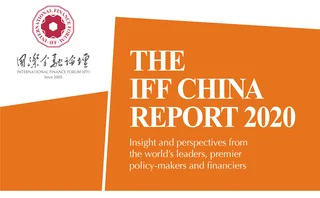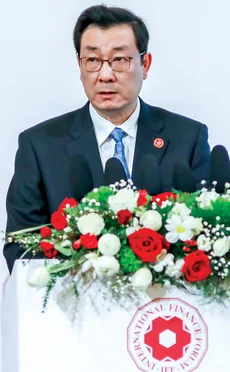
Faster, deeper, newer


The international political and economic landscape is undergoing complex and profound change. Increasing economic uncertainties and destabilisation go hand in hand with downward economic pressure. But, at the same time, a new round of global scientific and technological evolution and industrial transformation has emerged, injecting new impetus into economic development.
In this environment of new challenges and transitions, China is adhering to a fresh development concept, deepening supply-side structural reform and resorting to new methods of improving the quality and efficiency of economic development.

As an important part of the modern financial system, capital markets play a unique role in reducing the macro leverage ratio. They also support scientific and technological innovation, and accelerate industrial restructuring. Consensus is that deepening reform of the capital market will result in high-quality economic development. Thus, the increasing demand of investment and financing required will improve the investment and financing system.
Reforming the real economy
In accordance with the overall plan to deepen financial supply-side structural reform, since the beginning of 2019 the China Securities Regulatory Commission (CSRC) has advocated that the direction of marketisation and legalisation be in line with international best practices and comprehensively support the development of the capital market. The CSRC prioritised the optimisation of capital market supply and took the following measures to address any challenges between the financial sector and the real economy.
First, the CSRC launched the Science and Technology Innovation Board (Star Market) and implemented reforms around the listing system. Since July 2019, the Star Market has been operating smoothly, with 56 listed companies and a market value of more than CNY700 billion. After the reforms, the basic system of issuing, listing, trading and continuous supervision has withstood market tests.
Second, the CSRC is creating a favourable policy environment, conducive to direct financing and the normalisation of newly issued shares. In 2019, the CSRC revised the Measures for the administration of the material asset restructurings of listed companies, which allows eligible enterprises to be reorganised and listed on the Growth Enterprise Market (GEM). Several provisions on the pilot program of listed companies’ spin-off of subsidiaries for domestic listing have been recently completed and public opinion is being solicited.
Third, the CSRC has extended the two-way opening-up of the Chinese capital market to the outside world, announcing nine measures – of which six have already been implemented, including easier access for foreign investors to securities investment and funding custody business, reform of full circulation of H‑shares, and expanding the range of futures. A‑shares were smoothly added to FTSE Russell, Standard & Poor’s, the Dow Jones Industrial Average and other international indexes. In addition, the Shanghai–London Stock Connect and Sino–Japan ETF [exchange-traded fund] Connect programmes were officially launched. In the first 10 months of 2019, 143 companies in Shanghai and Shenzhen completed an initial public offering, raising a total of CNY162.4 billion of financial capital. Listed companies achieved CNY839.4 billion of refinancing, and the total value of mergers, acquisitions and restructuring transactions across the market reached CNY1.42 trillion. A total of CNY6.16 trillion of bonds were issued on the exchange market, including CNY2.59 trillion of corporate bonds. All of these figures exceeded the 2018 total.
In recent years, foreign capital has continued to flow into the Chinese stock and bond markets. More than CNY240 billion of foreign capital flowed into the stock market, indicating that international investors have long-term confidence in China’s capital market reform and sound economic development.
The Guangdong–Hong Kong–Macao Greater Bay Area (the Bay Area Development) has the highest degree of openness and the strongest economic vitality in China. It is also the frontier for the high-quality development of a capital market service economy. Historically, the formation of world-leading bay areas and city clusters cannot be separated from mature, efficient, innovative capital and a strong financial intermediary service system.
The Bay Area Development has always maintained close ties with and mutual support to the capital market. As for listed companies, by the end of October 2019 there were 563 A‑share listed companies in the Bay Area Development – 15% of China’s total – worth CNY10 trillion, representing 18% of the total market value. Intermediary agencies have considerable scale in this region: the number of securities, fund and futures companies registered in Guangdong Province is among the highest in China, combined with a large number of accounting and law firms.
With the launch of the Shanghai–Hong Kong and Shenzhen–Hong Kong Stock Connects, and the Mutual Fund Connect, the Bay Area Development has become an important bridge to deeper connectivity between the financial markets of mainland China, Hong Kong and Macao. In general, the capital market is playing an increasingly important role in co-ordinating the development of Guangdong, Hong Kong and Macao.
Moving forward
The Fourth Plenary Session of the 19th Central Committee of the Communist Party of China, which concluded in October 2019, reinforced explicitly how capital markets should be constructed, and outlined the characteristics of a modern financial system: high adaptability, competitiveness and inclusiveness. This should ensure the prevention or diffusion of economic and financial risks. Led by the CSRC, these principles have become the core of China’s institutional reform agenda. The aim is to establish healthy, effective and high-quality economic development.
In the future, the CSRC will further extend its breadth of coverage to enhance the inclusiveness of China’s multilevel market system. It will prudently enforce admittance to the Star Market by supporting and encouraging science and technology enterprises with core technology and high market recognition. Three reforms – that of the GEM, a pilot registration system and the reform of a new over-the-counter market – will continue. To achieve synergetic and co-ordinated development among markets at all levels, the CSRC will support qualified regional equity markets to carry out trials for institutional reform and business innovation.
Second, the CSRC will expand the Star Market pilot. Information availability and transparency will be key to enforcing effective regulation and efficient resource allocation, which will accelerate the formation of a market-oriented pricing mechanism for issuance. The CSRC also aims to establish mechanisms for enquiry, pricing and placing – with institutional investors as the main participants – and improve the system for refinancing mergers, acquisitions and reorganisations.
Third, the CSRC will continue to strengthen supervision, promote the construction of the primary market system and improve the quality of listed companies. It will optimise the increment, adjust the stock and unclog the diversified delisting channels – all while speeding up the construction of high-quality investment banks. For this to be successful, the CSRC has committed to harmonising divergent regulatory measures and improving the service capacity and core competitiveness of industry institutions.
By 2020, restrictions on foreign equity ownership of securities, futures and fund companies will be completely lifted. There will also be a revision of Qualified Foreign Institutional Investor and Renminbi Qualified Foreign Institutional Investor programme rules – the barriers to entry will be lowered and the scope of investment expanded. The CSRC will open up the exchange and bond market through easier access, expand the scope of investment and diversify entry channels for foreign capital. Meanwhile, in its supervision and risk control capacity, in particular cross-border law enforcement, the CSRC will ensure co-operation is improved.
Constructing a legal framework to optimise the ecological environment of the capital market is also a goal for the CSRC. The authority is determined to protect the legitimate rights and interests of investors; it therefore needs to establish a class-action litigation system that will introduce legal institutions for the capital market. The cost of and punishment for violations should be increased to strengthen legal enforcement. Through strengthened supervision and institutional reform, China’s capital market will become a reliable and valuable market for all types of investors.
Only users who have a paid subscription or are part of a corporate subscription are able to print or copy content.
To access these options, along with all other subscription benefits, please contact info@centralbanking.com or view our subscription options here: www.centralbanking.com/subscriptions
You are currently unable to print this content. Please contact info@centralbanking.com to find out more.
You are currently unable to copy this content. Please contact info@centralbanking.com to find out more.
Copyright Infopro Digital Limited. All rights reserved.
As outlined in our terms and conditions, https://www.infopro-digital.com/terms-and-conditions/subscriptions/ (point 2.4), printing is limited to a single copy.
If you would like to purchase additional rights please email info@centralbanking.com
Copyright Infopro Digital Limited. All rights reserved.
You may share this content using our article tools. As outlined in our terms and conditions, https://www.infopro-digital.com/terms-and-conditions/subscriptions/ (clause 2.4), an Authorised User may only make one copy of the materials for their own personal use. You must also comply with the restrictions in clause 2.5.
If you would like to purchase additional rights please email info@centralbanking.com







